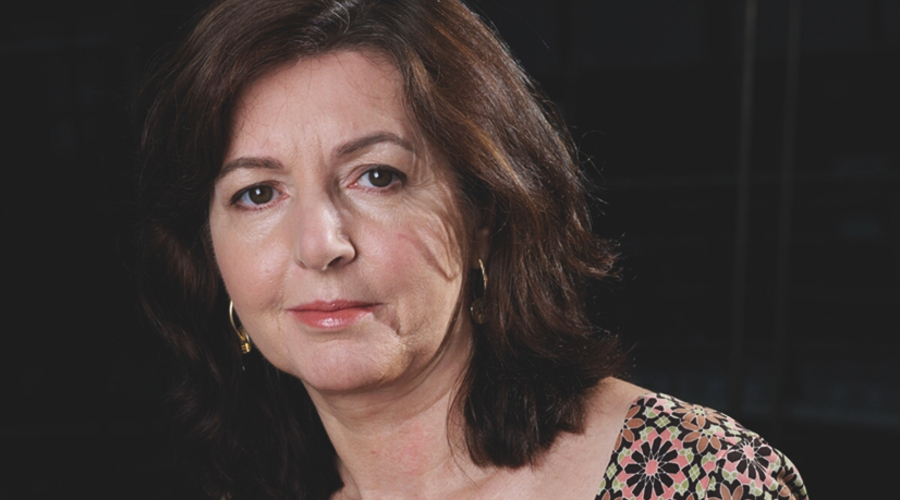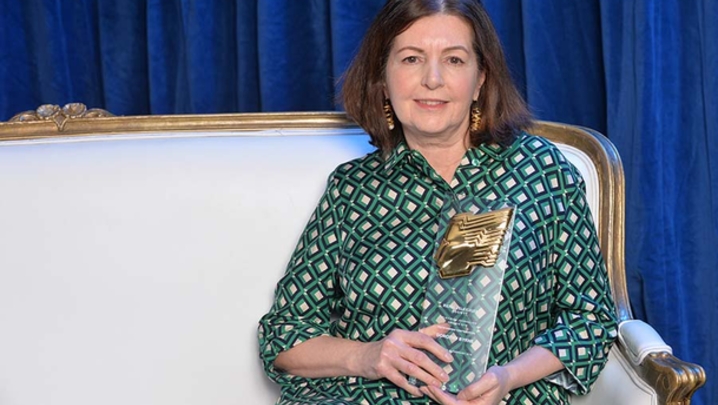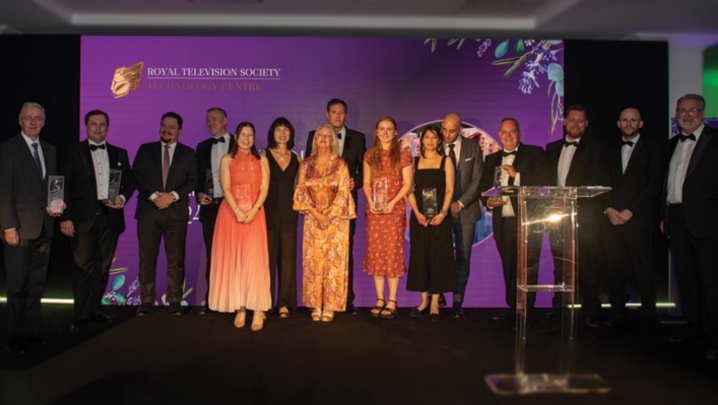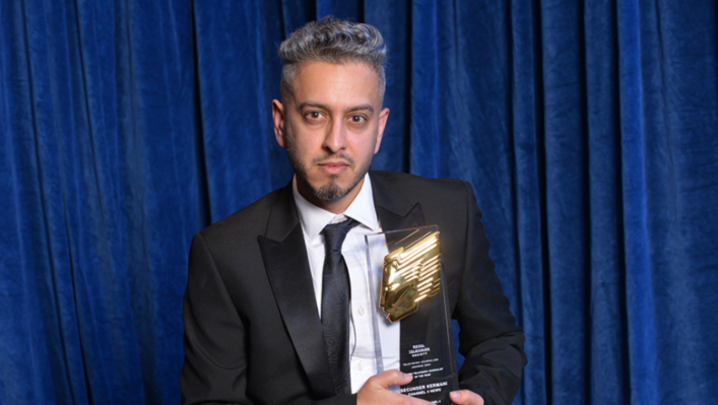Blunt and entertaining, Dorothy Byrne is clear that more diversity is the key to outstanding current affairs, reports Carole Solazzo
At her very first World in Action meeting as a young researcher, Dorothy Byrne experienced a feeling she couldn’t quite put her finger on. Until she realised that it was “the feeling I got if I accidentally wandered into the gents’ toilets – I shouldn’t be here!”
Being a rare woman in a man’s world in the early 1980s didn’t deter her, however, and Byrne has now worked in investigative broadcast journalism for nigh on four decades.
News and current affairs supremo at Channel 4 for the past 16 years, she started out at ITV as a producer on World in Action and The Big Story, moving to Channel 4 in 1998. Films commissioned by Byrne have won numerous Emmys, Baftas and RTS awards, and last year at the RTS Television Journalism Awards she received the Outstanding Contribution Award.
Blunt, entertaining and impassioned, Byrne discussed some of the challenges she’s met head on – and those still to be fought – at an RTS North West event in late April.
She started her career as she meant to go on. Byrne’s idea for her first World in Action was dismissed “by one senior man, [who] told her that marital rape wasn’t a story”. Another suggested that it was a subject “more suited to morning TV”. And a third said: “You can only make it if there is corroboration from other witnesses and medical evidence.”
So Byrne pushed “for permission to ring a ‘real’ lawyer, not a ‘fireside’ lawyer” and, after he came out in her favour, she was allowed to go ahead.
She has continued to fight for women’s issues to be given equal weight and broadcast time. “People think that stories have to be a ‘news’ story’,” she said, “but wickedness that’s been going on for decades is still wickedness, and we should expose it.”

Contribution Award in 2018
(Credit: RTS/Richard Kendal)
She added: “We hold power to account and, at our best, we investigate wickedness so it can no longer damage society and individuals. We should be really proud of what we do.”
Byrne recently commissioned successful films about breastfeeding and the formula milk scandal. “Individual women, particularly working-class women... get blamed for the fact that they don’t breastfeed, but they don’t get the help and support they need. And they’re still relentlessly flogged formula milk,” she said.
A desire to increase the diversity of the voices heard on TV partly informs Byrne’s commitment to covering foreign stories, despite higher costs and lower audiences. To make programmes more economically, she often works with foreign organisations. “We’ve won a lot of awards for our foreign coverage, so, if we go to broadcasters in other countries, they will often… come in with us,” she said.
And she is just as forward thinking when it comes to using non-TV platforms. “The young woman who filmed for us in a hospital in east Aleppo had half a billion [Facebook] views in one year for the films that she made.”
Channel 4 also releases special cut-downs of Unreported World on social media network LadBible. The channel doesn’t make money from this partnership, but using the site gives it the potential of reaching many millions of young viewers. On YouTube, Byrne added, “our Unreported World channel is approaching 1 million subscribers”.
The news executive is passionate about reaching out to the next generation, both viewers and programme-makers. After showing a clip of the multi-award-winning documentary Syria: Children on the Frontline, she revealed that it had been the young photographer’s first full-length film. He had previously made two short films in Aleppo for Channel 4 News. “I looked at them and thought, ‘He’s got such an eye and such sensitivity, he could make a whole film,’” she said.
Byrne brought ITN on board to provide “an experienced producer and executive producer to work with him. What counts in journalism is the story, the idea, the access – you don’t need to have made 15 Storyvilles.”
Turning to investigative journalism, she noted that “a major trend is international teams of journalists working together to take on highly complex financial institutions. I see an appetite to take on much bigger international companies and it’s one of the reasons I feel very positive.”
‘Dorothy Byrne: the future of investigative news journalism’ was an RTS North West event held at the University of Salford on 29 April. It was hosted by Jim Hancock, former political editor of BBC North West, and produced by Rachel Pinkney.
Byrne on… Diversity in television
‘What shocked me, having come from Scotland and the North [Byrne was born in Scotland and educated in Blackpool and Manchester] was [that] at Channel 4 everybody was so incredibly posh... loads of them had been to Westminster School.’
Byrne believes strongly that ‘[getting] working-class people in to TV is a major issue’, and she has set out to start redressing the balance with an MA in investigative journalism at De Montfort University, Leicester, developed by Channel 4, which takes half of its students from diverse backgrounds.
She spoke about bringing more jobs to the North of England. ‘Channel 4 is moving 300 people to Leeds,’ she said. ‘We need a major rebalancing of where the jobs are and that will improve coverage. If the vast majority are living in Chiswick, you get a Chiswick view.’
One of the four commissioners in her department will move to Glasgow, and she plans to commission more programmes from Leeds and Manchester. ‘Fifty per cent of all our output has to be out of London. I’ve said to companies, “If you don’t move out of London, I can’t commission you any more.”’
To audience laughter, she added, ‘And really move out of London. Not pretend to move out of London to your holiday home. What will [bring about] change is pressure both from within the industry and from the public. There are a lot more women [in TV] now. A lot of what I’ve said tonight [happened] because women got positions of power.
Byrne on… Covering Brexit
‘The issue about Brexit isn’t a remainer versus a Brexiter attitude. It’s that we [all journalists]… spent too long saying, “This is what one side says, this is what the other side says” in a desperate attempt to prove that we were duly impartial.’
Being duly impartial ‘is a big part of what we must be, but an even bigger part is telling people the truth. Brexit journalism [hasn’t been] daring enough about saying our job isn’t just to follow other people’s agendas, it’s about trying to identify... the really important things that people need to know about.
Byrne on… Getting your first break
‘Be pushy. I went to 10 top people in TV journalism... and got each of them to nominate three young people who they thought were successful,’ Byrne said. ‘[One] came from a normal background [in the North]. He found out where [chief correspondent] Alex Thomson was staying on holiday, and walked up and down the beach... for two or three hours until he found him.
‘He went up to Alex and said: “I really want to be a journalist. Can I have some work experience on Channel 4 News?”
‘And that bloke is doing really well now.’






